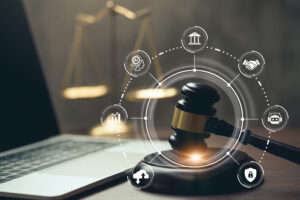In today’s digital age, the legal industry faces a unique set of challenges when it comes to safeguarding confidentiality. Lawyers, law firms, and legal professionals handle an abundance of sensitive and confidential information daily, making them prime targets for cybercriminals seeking to exploit vulnerabilities. This article explores the critical importance of cybersecurity in the legal industry and the measures that legal practitioners can take to protect the confidentiality of their clients and sensitive data.

The Growing Threat Landscape
The legal industry is not immune to the evolving threat landscape of cybersecurity. In fact, it is an attractive target for cybercriminals for several reasons:
- Valuable Data: Law firms store a treasure trove of valuable information, including client records, financial data, intellectual property, and legal strategies. This information is highly sought after by cybercriminals for financial gain or competitive advantage.
- Limited Security Awareness: While legal professionals excel in their fields, they may not always have the cybersecurity expertise necessary to protect against digital threats effectively. This knowledge gap can leave them susceptible to attacks.
- Increased Remote Work: The COVID-19 pandemic accelerated the adoption of remote work in the legal industry. This shift created new security challenges as lawyers and staff accessed sensitive data from various locations and devices.

Safeguarding Confidentiality: Best Practices
To mitigate these risks and ensure the highest level of confidentiality, legal professionals should implement robust cybersecurity practices:
- Data Encryption: Encrypt sensitive data both in transit and at rest to ensure that even if it falls into the wrong hands, it remains unreadable and unusable.
- Secure Communication: Use secure communication channels for sensitive client discussions and document sharing. Encourage the use of encrypted email services and messaging platforms.
- Access Control: Implement strict access controls to limit who can access sensitive information. Use strong, unique passwords and multi-factor authentication (MFA) to protect accounts.
- Regular Training: Provide ongoing cybersecurity training for all staff members to raise awareness of phishing attempts, social engineering, and other common attack vectors.
- Update and Patch: Keep all software and systems up to date with the latest security patches to prevent known vulnerabilities from being exploited.
- Incident Response Plan: Develop a comprehensive incident response plan that outlines the steps to take in the event of a cybersecurity incident. This plan should include a process for notifying affected clients promptly.
- Vendor Risk Assessment: Assess the cybersecurity practices of third-party vendors and service providers who have access to your firm’s data. Ensure they meet your security standards.
- Secure Mobile Devices: Implement mobile device management (MDM) solutions to secure smartphones and tablets used by legal professionals. Enforce encryption, remote wipe capabilities, and strong authentication.
- Regular Backups: Maintain regular and secure backups of critical data to ensure it can be recovered in the event of data loss due to ransomware or other cyberattacks.
- Cyber Insurance: Consider investing in cybersecurity insurance to mitigate financial risks associated with data breaches and cyber incidents.

The legal industry holds a solemn duty to protect the confidentiality and trust of its clients. In the digital era, this duty extends to safeguarding client information from the ever-present threat of cyberattacks. Legal professionals must recognize that cybersecurity is not optional; it is an ethical and legal obligation.
By adopting a proactive cybersecurity stance, investing in staff training, and implementing robust security measures, the legal industry can continue to serve its clients with the highest level of confidentiality and integrity. As cyber threats continue to evolve, the commitment to safeguarding client data remains paramount in maintaining the trust and reputation of the legal profession.



